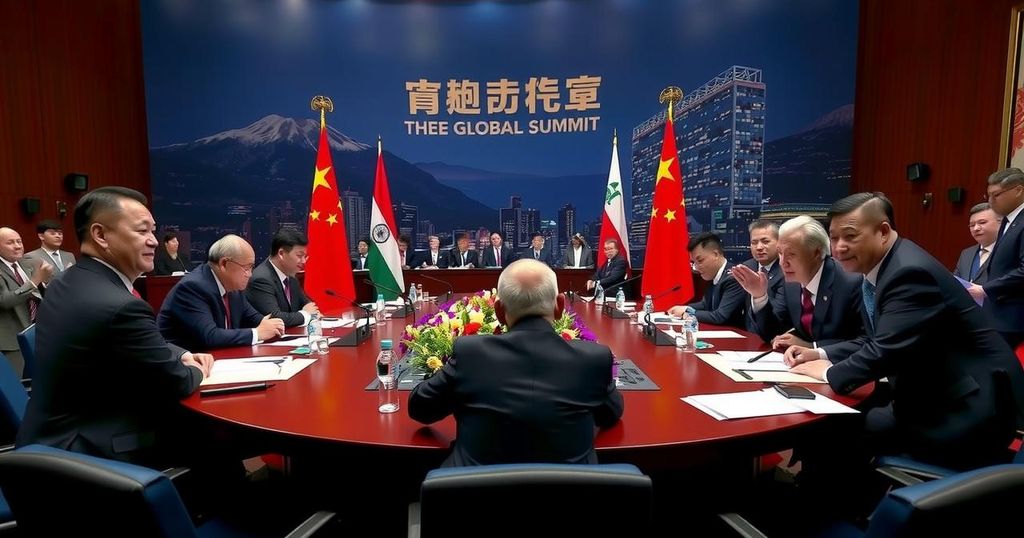Global news
AMERICA, ASIA, ASIA - PACIFIC ECONOMIC COOPERATION FORUM, BEIJING, BID, BIDEN, BRAZIL, CHANCAY, CHINA, COSCO, DINA BOLUARTE, ECONOMIC COOPERATION, FOREIGN POLICY, INTERNATIONAL RELATIONS, JOE BIDEN, LATIN AMERICA, LIMA, MEXICO, NORTH AMERICA, PACIFIC, PERU, SOUTH AMERICA, TRADE RELATIONS, UNITED STATES, US, XI, XI JINPING
Isaac Bennett
0 Comments
China Takes Center Stage as Biden’s Influence Wanes in Latin America
During the APEC Forum, President Joe Biden found himself marginalized as China, represented by Xi Jinping, dominated the stage. The event underscored shifting power dynamics, with Xi’s significant investments in Latin America contrasting with the US’s dwindling influence. The complexities of US-China relations and the varying approaches to diplomacy in the region highlighted the changing geopolitical landscape.
During the Asia-Pacific Economic Cooperation Forum, President Joe Biden was notably sidelined as the focus shifted to China and its leader Xi Jinping, who took center stage during the leaders’ “family photo.” The event underscored the changing dynamics in a region traditionally viewed as America’s sphere of influence, with Biden’s presence appearing to be a mere afterthought. Xi’s visit showcased China’s longstanding ties with Peru, exemplified by substantial investments such as a new £2.6 billion mega-port operated by a state-owned Chinese company. In a press release, Xi touted the deep respect and affection between Peruvians and the Chinese people, which he attributed to their shared historical legacies. Meanwhile, China’s Belt and Road initiative has committed $286 billion into Latin American infrastructure, emphasizing a strategic economic approach that the US has struggled to replicate. Although President Biden had a meeting with Xi—who deemed their relationship as paramount to global stability—the US is grappling with the implications of China’s growing influence. As China seeks to cement its presence in the region through trade agreements and infrastructural projects, US officials express concerns over potential military encroachments and the need for stable bilateral relations. Eric Farnsworth from the Council of the Americas commented on the missed strategic opportunities for the Biden administration in fostering stronger ties with Latin America, particularly in infrastructure development, which China has effectively leveraged. Complicating matters, Biden’s decision not to engage too closely with Peruvian President Dina Boluarte—a leader facing severe domestic backlash and corruption allegations—highlights the tension between American democratic ideals and the political realities in Latin America. Observers note that while the US government seeks to uphold democratic standards, China’s approach often entails investment without political strings attached, which is appealing to many Latin American nations, anticipating economic growth without stringent conditions. Biden’s absence in the spotlight at this major summit illustrates a significant shift in the geopolitical landscape, raising concerns about America’s diminished influence in a region that is increasingly leaning towards Chinese cooperation. The complexities of US-China relations and their divergence in Latin America will continue to shape diplomatic strategies moving forward.
The Asia-Pacific Economic Cooperation (APEC) Forum serves as a platform for member economies to engage in discussions concerning trade, economic growth, and cooperation. In recent years, the geopolitical landscape has evolved, increasingly featuring China’s rising influence in various global arenas, including Latin America. The region, rich in natural resources, has attracted substantial Chinese investments, particularly through initiatives such as the Belt and Road. The competition between the US and China in establishing partnerships in Latin America raises questions about the future stability of these nations and their alignment with democratic values.
The Asia-Pacific Economic Cooperation Forum highlighted significant shifts in global power dynamics, emphasizing China’s premier role in Latin America at the expense of the United States’ influence. Xi Jinping’s strategic engagements and investments in Peru contrast with President Biden’s overshadowed presence, underscoring a need for the US to reassess its approach to economic diplomacy. As these developments unfold, the implications for both the regional landscape and US-China relations will continue to garner attention.
Original Source: www.telegraph.co.uk




Post Comment